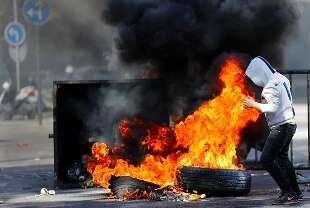The Lebanon-Israel talks on the Mediterranean borders begin
Lebanon: 17 tons of EU aid delivered to Beirut
Anger explodes again in Beirut.
Macron with the UN for aid to Lebanon: "The world should act quickly"
Share
March 16, 2021New popular protests are underway today in Beirut and in various cities of Lebanon with the spread of the news that the local lira has reached a new negative record in the exchange with the US dollar.
The Lebanese pound has lost more than 90% of its value in 18 months: in 2019, 1,500 pounds bought a dollar, but today it takes 15,000.
Until a few weeks ago in the real exchange market, a US dollar was sold for about 9 thousand lire.
But within two weeks, with the worsening of the local political situation due to the prolonged stalemate in the formation of the government and the profound distrust of the markets, the lira further lost value.
This is causing a sudden rise in the prices of consumer goods and services, in a context in which electricity and gasoline are in fact being rationed in ever greater quantities.
Protesters blocked the streets in the very central Via Hamra, in the commercial and entrepreneurial heart of Beirut, a stone's throw from the headquarters of the Central Bank.
Other roadblocks occur in the Tripoli area in the north, and Sidon in the south, as well as in the central part of the Bekaa valley in the east.
Meanwhile, the toll of night clashes between demonstrators is about ten injured.
Beirut media reports that some demonstrators have cut off traffic on various roads in the capital and other cities in the country.
Gas stations began rationing fuel sales yesterday for fear of running out of stock due to the lack of dollar funds to purchase the fuel.
For weeks, the Lebanese Electricity Company (EDL) has further rationed the supply of electricity for domestic use due to the lack of fuel to power the plants.
The United States and Russia are once again
mobilizing their respective diplomacies on Lebanon in crisis: in the last hours an American government delegation led by General Kenneth McKenzie, head of the US central command (Centcom) met the commander of the Lebanese army in Beirut, General Joseph Aoun.
While a delegation of pro-Iranian Hezbollah visited Moscow, where it was welcomed yesterday by Russian Foreign Minister Serghiei Lavrov.
The media in Beirut highlight these diplomatic initiatives, seemingly distinct but which, local analysts say, are part of Washington and Moscow's efforts to ensure that the worst crisis Lebanon is facing in the past 30 years does not degenerate into chaos. social and political on a national scale.
Since the autumn of 2019, the country has experienced growing social tension, with periodic moments of popular anti-government mobilization against the backdrop of an unprecedented devaluation of the local lira (which has lost about 90% of its value in 18 months).
The Hezbollah, fully integrated into central and local institutions and which have an alternative military force to the Lebanese army, had "a cordial and frank conversation" with Lavrov in Moscow, reports today on TV to Manar of the same Lebanese Shiite movement. .
For his part, the Lebanese general Joseph Aoun found in the US delegation the full reassurance that the Lebanese army will not be abandoned to the risks of the economic crisis.
The Lebanese armed forces have been called for more than a year to contain popular protests on the streets but its members are exposed like all other Lebanese to the disastrous effects of the economic crisis.

